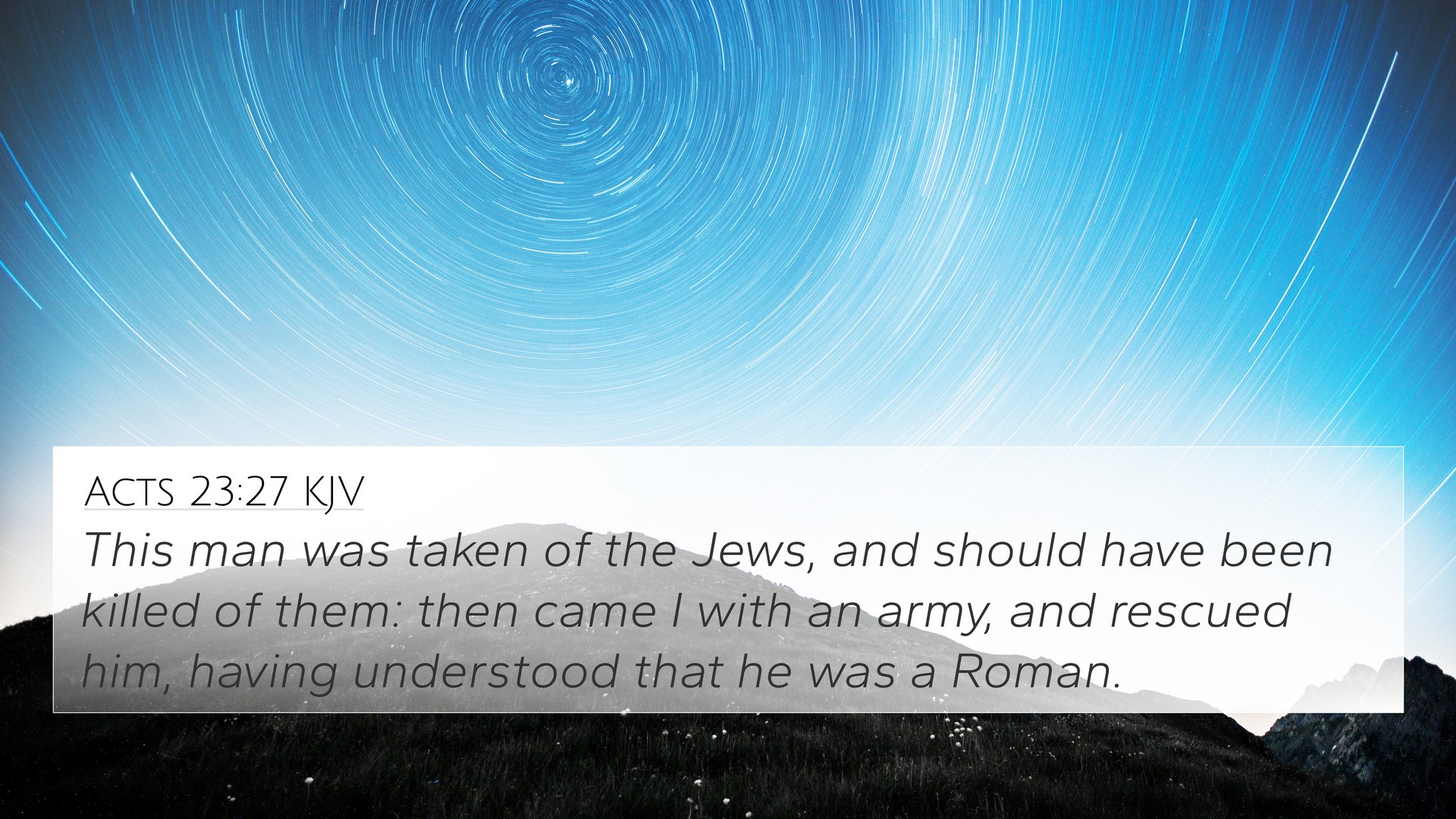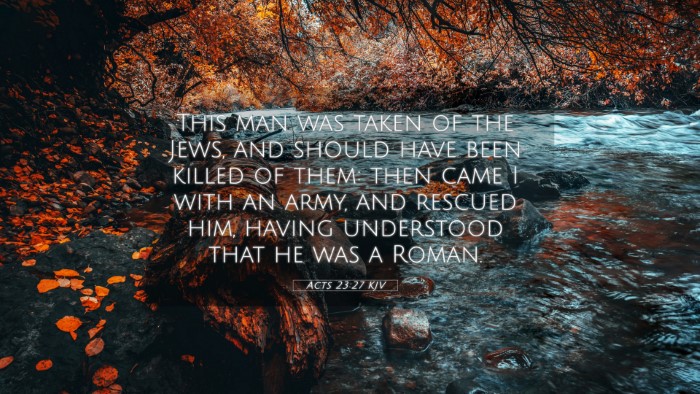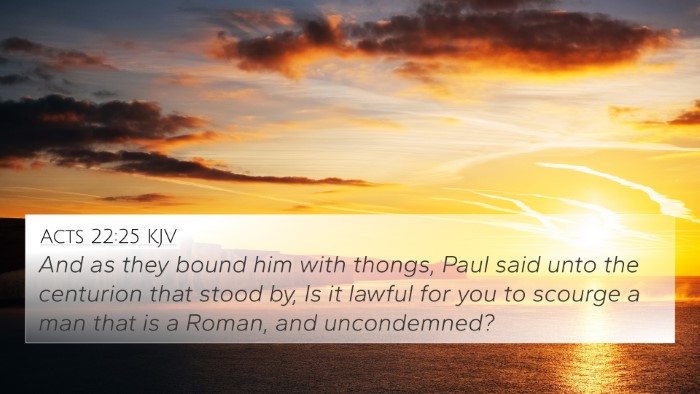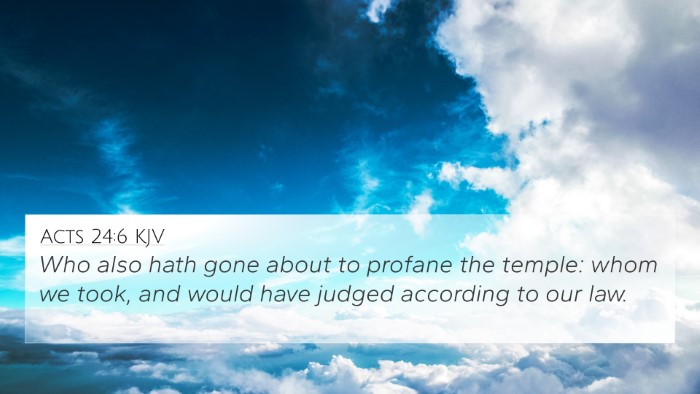Meaning and Interpretation of Acts 23:27
Acts 23:27 states: "This man was seized by the Jews and was about to be killed by them; but I came up and rescued him, having learned that he was a Roman." This verse provides important insight into the events surrounding the Apostle Paul's defense and the complexities of Roman law applied within the context of a Jewish uprising.
Contextual Overview
The book of Acts, authored by Luke, chronicles the establishment and spread of the early church, focusing particularly on the apostles' missions. Acts 23 details the tensions between Jewish leaders and Paul, culminating in a rescue by Roman authorities.
Key Themes
- Protection and Rescue: The Roman commander intervenes to save Paul from a mob.
- Identity and Rights: Paul's status as a Roman citizen plays a crucial role in his protection.
- Conflict Between Cultures: The friction between Jewish and Roman societal norms is evident.
Commentary Insights
Matthew Henry's Commentary
Henry emphasizes the unexpected nature of Paul's rescue, which showcases God's providence. The Roman officer's intervention reflects God's oversight in ensuring the spread of the gospel, while also highlighting Paul’s Roman citizenship, which adds to the legitimacy of his mission.
Albert Barnes' Notes
Barnes notes the contrast between how Roman authorities treated Paul in comparison to the Jewish zealots. The commander’s decision to save Paul underscores both legal protection under Roman law and demonstrates how God can use secular authority for His purpose.
Adam Clarke's Commentary
Clarke discusses the importance of the Roman law and the implications of Paul’s background. His identity not only saves him but also serves as a bridge between two cultures. Clarke points out the significance of this event in the historical context of the early church’s growth.
Cross-References
Acts 23:27 can be cross-referenced with the following scriptures:
- Philippians 1:28: Paul writes about his confidence in facing adversaries.
- Romans 13:1-7: Understanding the role of authorities under God's sovereignty.
- Acts 22:25: Paul’s assertion of his Roman citizenship protects him from flogging.
- Matthew 10:16: Jesus sends His disciples out as sheep among wolves, paralleling Paul’s situation.
- Acts 21:30-31: The initial assault on Paul leading to his arrest.
- 2 Corinthians 11:24-26: Paul recounts his persecutions and dangers faced during his ministry.
- Genesis 12:3: The promise to Abraham shows God's protective nature over His people.
Thematic Connections and Inter-Biblical Dialogue
Connecting Acts 23:27 with other biblical texts reveals deeper themes of protection, identity, and cultural conflicts:
- Cultural Identity: The themes of culture clash appear in other passages addressing the interactions between Jews and Gentiles. For example, in Acts 10, Peter’s vision illustrates the breaking of cultural barriers.
- God’s Providence: Similar to Esther's narrative where God positions individuals for protection, Paul’s situation highlights divine orchestration in his ministry.
- The Importance of Citizenship: Citizenship as a legal safeguard is further examined in other epistles, particularly in reference to spiritual citizenship in Philippians 3:20.
Tools for Deepening Understanding
To further explore Acts 23:27 and its related verses, several tools are beneficial:
- Bible Concordance: Helpful for identifying specific words and phrases.
- Bible Cross-Reference Guide: Essential for tracking thematic elements across scriptures.
- Cross-Reference Bible Study Methods: A structured approach to connect verses systematically.
- Bible Reference Resources: Using commentaries and theological texts to enhance understanding.
Conclusion
Acts 23:27 serves as a pivotal moment in Paul's journey and the early church. The intersection of faith, identity, and legal rights under Roman governance illustrates the complexities of spreading the gospel during tumultuous times. By examining related scriptures and themes, readers gain a broader understanding of the biblical narrative at play.






